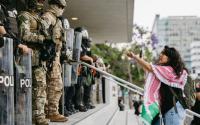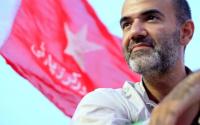July 7, 2004
Salim Lone |
|
Before Iraq had unraveled, Tony Blair last November delivered one of his most impassioned defenses of the war at the Lord Mayor's banquet. He was hoping to undercut critics before President Bush's visit. Iraq, he said, was "the battle of seminal importance for the early 21st century. It will define relations between the Muslim world and the west. It will influence profoundly the development of Arab states and the Middle East. It will have far-reaching implications for the future of American and western diplomacy." The prime minister was right - but a decade late in understanding the centrality of Iraq in the current world order. It was the first Gulf war in 1991 and the accompanying sanctions and stationing of US troops in Saudi Arabia that had driven deep cleavages in relations between Islam and the west. More important, it had given rise to the age of global terror - beginning with the first World Trade Center bombing in 1993. In the decades of Palestinian and Arab anger at the US for its close support of Israeli occupation, it had never before been targeted except in the Middle East. To say this is not to underestimate the impact of the current war and occupation of Iraq, which have made the US a reviled power in the Arab and Muslim world, and are creating powerful new hatreds globally and seeing thousands of terrorist recruits joining the anti-US battle. Most of the world had opposed this war in fear of just such an outcome, but it now seems to feel powerless to influence the US in the face of Washington's determination to "stay the course". In most countries, Bush is held responsible for the terror crisis, but this is unfair. The groundwork for the crisis was laid by President Bush Sr and his European and Arab partners who, in 1990, went along with his decision to mete out severe punishment to Iraq for its invasion of Kuwait. Many had warned of unprecedented Muslim fury if Iraq were attacked, since the UN had never before approved the use of force to counter an invasion. More important, Israel had for years been allowed to occupy Palestine and parts of Syria and Lebanon with impunity. But the US, flexing its muscles as the sole superpower, was not to be deterred - and the war was ruthlessly prosecuted. Martti Ahtisaari, the then UN under-secretary general (and later Finnish president) went to Iraq to assess the damage. He told the general assembly: "The conflict has wrought near-apocalyptic results and most means of modern life have been destroyed." Worse was to follow, with the most punitive sanctions in modern history destroying Iraqi society and claiming the lives of at least half a million children. But the predicted upheavals in Arab countries allied to the US failed to materialize after the war, and there was public glee in the nascent neoconservative movement, which saw in this the validation of its view that the US had been too constrained in using force in its Middle East dealings. No one was particularly interested in seeing the profound alienation that was developing among Muslims worldwide, and the related establishment of a global terrorist network. The world again seems powerless to influence the US in the face of the even more rapid growth of anti-western sentiment resulting from the current war. There is no graver challenge than stemming the growth of terrorism practiced by aggrieved Muslims. The rise of such militancy is driven by US policies and cannot be glossed over with self-serving assertions that "they" hate western freedoms and are inherently barbaric and uncivilized. Beheadings are indeed so, but so is the killing of over 600 innocent Fallujans in a week of aerial bombing, or the death of 500,000 children through UN sanctions. The depth of this anti-US animus is recent. Muslims and Arabs gravitated towards the US for decades, and worked closely with Washington to fight the Soviet occupation of Afghanistan. But even the most moderate now see the US as bent on crushing Islam. There is only one way to confront the terrorism challenge, which is for the US to extend Muslims a hand of friendship and embrace their legitimate causes. This would allow Muslims themselves to confront those who might still continue to practice terror. But merely rolling back the aggressive Bush administration policies will not be sufficient to win Muslim trust; many more far-reaching changes than are part of current US political discourse are needed. In the quest for peace, a just solution to the Palestinian crisis remains a vital priority, but we should discount wishful assertions that ending that conflict will make indirect US dominion over Iraq more acceptable. Over the past 14 years Iraq has for millions replaced Palestine as the touchstone of Muslim pain. A beginning must be made there, and a UN mission given the responsibility for reconciling that torn nation. Salim Lone is the former director of communications for the UN mission in Iraq
© Guardian Newspapers Limited 2004 |






